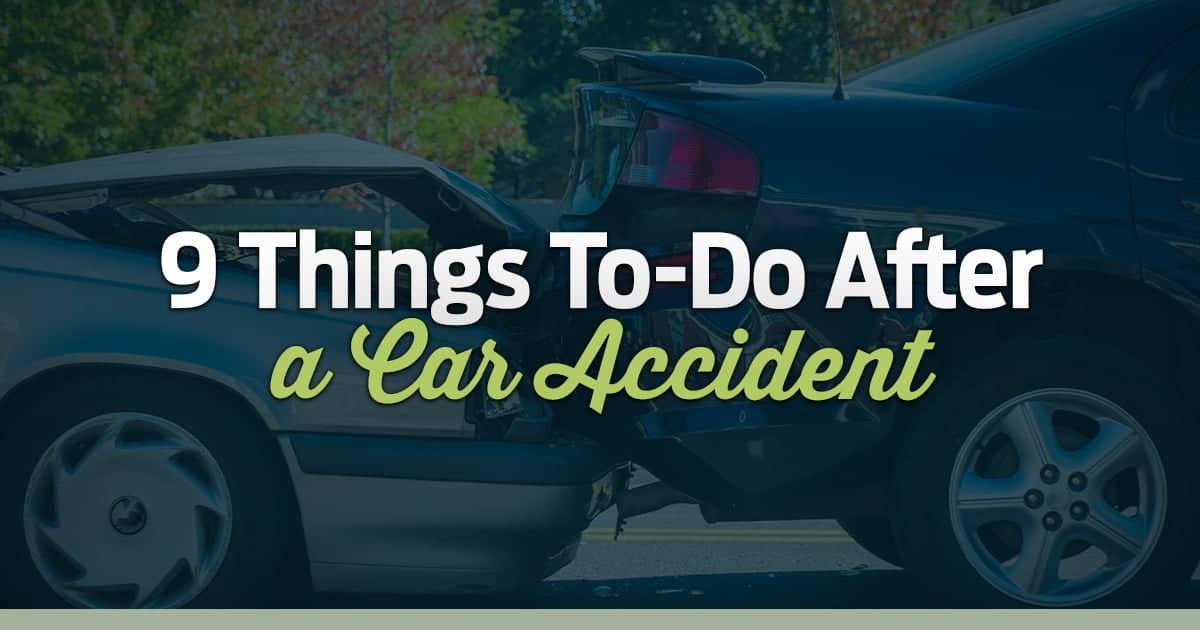
9 Things to Do After a Car Accident
August 29, 2021
Share:
A car jumps out in front of you unexpectedly, and you slam on your breaks. You hear a crunch and jolt forward in your seat. While the vehicle in front of you drives away unscathed, the one behind you wasn’t watching the road and smashed into the back of your car.
Over 300,000 accidents happen in Canada every year. When you think about how many vehicles are on the road at any given time, that number might make a little more sense. Therefore, it’s critical that you understand what next steps to take following an automobile accident.
Here are 9 things to do after a car accident:
1. Stay Calm
This may seem obvious now, but car accidents, especially severe ones, can be traumatic experiences that leave people shaken and confused. If you didn’t know what to do beforehand, it might be difficult to plot out your next steps in your post-accident shock. Remember that even the smallest crash can result in an emergency, so remaining calm and alert can keep you and others from further harm.
2. Check for Injuries
Shock can mask pain so start by checking yourself for any injuries. If you are unhurt, move on to any passengers in your car before helping passengers in the other car. Ask each person if they are feeling any pain and if they can move all of their limbs.
Assess for any of the following symptoms:
- Dizziness
- Fainting
- Neck, shoulder, or back pain
- Numbness
- Ringing in your ears
Keep in mind that you may not feel these symptoms directly after the accident. Your body is being pumped with adrenaline hormones, which suppress pain. You should monitor yourself for any worsening symptoms or new symptoms for hours or even days after the accident. If you are experiencing any of these, you should call a doctor as soon as possible.
3. Call for Help
If anyone in your car or the other car is injured, call 911 immediately. Do not try to move any injured passengers as it may worsen their condition.
4. Report the Incident
You are required by law to report accidents to the police when:
- The total damage to all vehicles exceeds $2,000
- Someone is injured or fatally injured
- The accident involves a government vehicle
- One of the drivers involved in the collision is uninsured
- A criminal act caused the accident (impaired driving, DUI, etc.)
- The accident involves a pedestrian or cyclist
- Damage is caused to a private or municipal property
If your accident doesn’t meet any of the criteria for reporting it to the police, you will instead have to visit the nearest Collision Reporting Centre within the first 24 hours after the accident to fill out a report. You can find a list of all the Collision Reporting Centres in Ontario HERE.
5. Remain At the Scene
If you don’t remain at the scene of the accident, you could be charged with “fleeing the scene of an accident” which could mean a hefty fine or even jail time. Additionally, if you fail to report an accident to the correct authorities you may still be charged.
At this point, you’ll also want to move your vehicle to the side of the road if it is safe to do so. If you can’t move your car, simply put the hazard lights on and leave the vehicle where it is.
6. Document the Damage
Take photos or videos of the damage done to your vehicle. This is also a good time to write down some of the other factors of the accident, like weather, road conditions, and the accident location. The more details, the better. Try to get the contact information for any witnesses as well.
7. Exchange Information with the Other Driver(s) Involved
Ask the other driver(s) for the following information:
- Drivers’ license numbers
- Drivers’ names and contact information
- Insurance policy numbers
- License plate numbers
- Names of their car insurance companies
Depending on where you live, you are expected to exchange different information – but the points listed above are a good start.
8. Call a Tow Truck
Legally, you are required to wait for the police to arrive to examine your vehicle before you can have it towed away. When contacting a towing company make sure to:
- Ask how much the towing costs will be
- Have your vehicle towed to the nearest Collision Reporting Centre
- Don’t sign anything without reading and understanding what you are signing
Related Read: Tips for Avoiding Tow Truck and Storage Scams
9. Call Your Insurance Broker
One of the most important steps following an accident is reporting the accident to your insurance broker. No matter the severity of the collision you must report it to your insurance company and provide them with the following:
- Your Insurance Policy Information – Your name and policy number
- Information About the Car – The year, make and model of the vehicle
- Details about The Accident – Provide as much information as you can about the weather, location, and other details involved in the accident
- The Driver, Car, and Insurance of the Other Vehicle(s) – This is where the information you exchanged with the other driver will come in handy
- Police Officer Information – Have the name and badge number of the police officer who came to the scene (if there was one)
After your claim has been submitted a claims adjuster will get in touch with you to discuss what needs to happen going forward. The adjuster will review your policy and see what you are covered for, while also determining how much your insurance company will compensate you. They will work with you until you receive compensation for your accident.
If you need to file a claim you can call our emergency claims number at 519-348-9150 or fill out a claims form online. You can also download Excalibur’s Mobile Dashboard app to report an accident directly through your phone.






